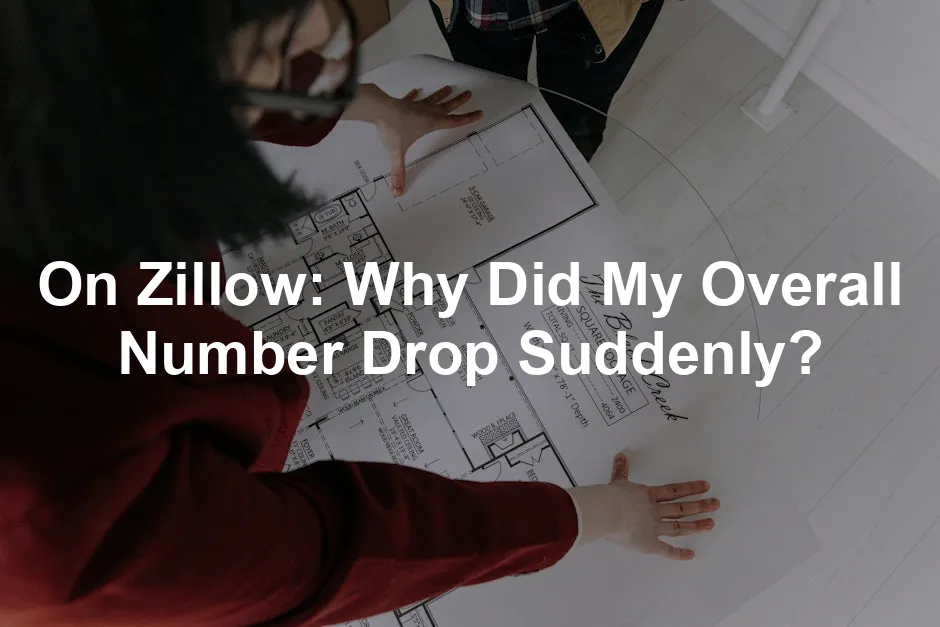
On Zillow: Why Did My Overall Number Drop Suddenly?
Introduction
Have you ever checked your home’s value on Zillow and been shocked by a sudden drop? This phenomenon can be concerning for homeowners and potential sellers alike. Understanding why these fluctuations happen is crucial for navigating the real estate market effectively.
If you’re looking to get a better grasp on your home’s value or even dive into the real estate market, consider picking up a copy of Zillow Home Value Estimator Book. This book can help demystify the process of home valuation and give you the insight you need to better understand the market.
Summary and Overview
Zillow’s home value estimates, known as Zestimates, are based on a complex algorithm that analyzes various data points. Homeowners may notice sudden changes in their estimated home values due to several factors. It’s important to remember that Zestimates are not official appraisals; instead, they rely on data trends and market activity. Throughout this article, we’ll discuss how Zestimates work, the reasons behind sudden drops, and what you can do to address them.
For those looking to invest in real estate, Real Estate Investing for Dummies is an excellent resource to start your journey. It covers everything from basic terms to advanced strategies, ensuring you’re well-prepared to make informed decisions.

Why Home Values Drop on Zillow
Understanding Zillow’s Zestimate Algorithm
Zillow calculates home values using a proprietary algorithm that considers multiple data inputs. These inputs include recent sales of comparable homes, tax assessments, and property characteristics. While Zestimates aim for accuracy, they can be off by a significant margin. According to Zillow, their median error rate for on-market homes is around 2-8%. This means that your home’s Zestimate might not reflect its true market value. Understanding how these algorithms function can help homeowners navigate the ups and downs of home valuations.
If you want to dive deeper into the intricacies of real estate investing, check out The Book on Rental Property Investing. This book offers practical advice on becoming a successful landlord and maximizing your rental income.

Common Reasons for Sudden Drops in Zestimate
Recent Comparable Home Sales
One of the biggest factors that influences your Zestimate is the sale prices of comparable homes in your area. If similar homes nearby sell for lower prices, your Zestimate may drop. This happens because Zillow’s algorithm analyzes recent sales data to adjust home values accordingly. If the market sees a trend of declining prices, it will reflect in your home’s value.
Local market conditions matter a lot here. If your neighborhood experiences a downturn, it can negatively impact your estimate. For example, if several homes sell below their expected values, it can create a ripple effect. Your home’s value might decrease as a result, even if you haven’t made any changes.
Think about it: If you live in a vibrant community, but similar homes are selling poorly, it could signal a larger issue. So, keeping an eye on comparable sales and local market trends is essential for understanding your Zestimate.

To further enhance your understanding of the market, consider reading The Millionaire Real Estate Investor. This book provides valuable insights into building wealth through real estate, focusing on the importance of understanding market dynamics.
Market Condition Shifts
Broader economic factors can also play a significant role in your home’s value. Changes in interest rates, demand, and overall economic health can lead to fluctuations in home prices. For instance, if interest rates rise, fewer buyers may be able to afford homes, decreasing demand. This shift can lead to lower home values, thus affecting your Zestimate.
Data on market trends can provide insights into these shifts. If you notice a pattern of declining prices in your area, it may be time to reassess your expectations. Remember, the housing market can be unpredictable. Just like any other market, it goes through cycles. Understanding these cycles can help you navigate fluctuations more effectively.

If you’re looking to sell, consider working with a real estate professional who understands current market conditions. They can guide you through pricing strategies that reflect the evolving landscape. For additional help, the Home Buying Kit for Dummies can be an invaluable resource.
Algorithm Updates
Zillow regularly updates its algorithms to enhance accuracy. These changes can have a significant impact on your home’s estimated value. Sometimes, these updates may lower your Zestimate, even if your home hasn’t changed at all. This can be frustrating, but it’s crucial to understand that these adjustments are based on evolving data and methodologies.
Historically, notable algorithm changes have led to shifts in home values across the board. For example, when Zillow recalibrated its approach to valuing properties, many homeowners saw unexpected drops in their Zestimates. This indicates just how sensitive these values can be to algorithm changes.

It’s important to keep in mind that Zestimates are not set in stone. They’re designed to provide a general idea of value based on the latest available data. If you think your Zestimate has dropped unfairly due to an algorithm update, consider reaching out to Zillow for clarification. Understanding how these updates work can help you manage expectations better.
By staying informed about comparable sales, market conditions, and algorithm changes, you can gain a clearer understanding of your home’s value. This knowledge will empower you to make informed decisions, whether you’re selling your home or simply monitoring its value.
Missing or Inaccurate Home Data
Have you ever wondered why your home’s Zestimate suddenly dropped? One common reason is missing or inaccurate information in your Zillow profile. If Zillow lacks complete details about your property, it can lead to a lower estimate. This is because their algorithm relies heavily on data to make accurate assessments.
So, what can you do? First, check your Zillow profile. Make sure all features of your home are accurately listed. Include details like square footage, number of bedrooms, and any recent renovations. Correcting these inaccuracies can significantly improve your Zestimate. You can update your home’s information easily through the Zillow website. Just claim your home and make the necessary edits.

Listing Your Home
Listing your home also affects your Zestimate. When you put your home on the market, Zillow incorporates listing data into its algorithm. This means the price you set can influence your home’s estimated value. If you adjust your list price, it may lead to fluctuations in your Zestimate.
For instance, if you list your home significantly higher than similar properties, Zillow may lower your estimate. Conversely, pricing your home competitively can help maintain or even increase your Zestimate. Always consider recent sales and local market trends when setting your price.

Seasonal Variations
Have you noticed your home’s value dip during certain times of the year? Seasonal trends play a big role in home values. Typically, the real estate market has peaks and valleys. Spring and summer are often the busiest seasons, with higher demand and prices. Conversely, fall and winter can see a slowdown, leading to lower home values.
This cyclical nature means that if you check your Zestimate in winter, it might be lower than in the spring. Understanding these housing market cycles can help you manage your expectations.
If you’re considering selling, timing can be crucial. Listing your home during peak seasons may yield better results. Keep an eye on local market trends and consider seasonal patterns when evaluating your home’s value. This knowledge will empower you to make informed decisions. And while you’re at it, a Home Maintenance Made Easy Book can provide seasonal checklists to help you stay on top of your home’s upkeep.

How to Address a Sudden Drop in Zestimate
Experiencing a sudden drop in your Zestimate can feel alarming. Fortunately, there are actionable steps you can take to address this issue effectively.
Updating Your Home Information
First, ensure your home profile on Zillow is accurate. Start by claiming your home on the Zillow platform. After verification, you can update essential information. Make sure the square footage, number of bedrooms, and other key features reflect reality.
If you’ve made renovations or improvements, don’t forget to include them. Zillow’s algorithm relies heavily on accurate data. Missing updates can lead to lower estimates. By providing complete and correct details, you enhance your profile’s credibility, which may positively influence your Zestimate.

Getting a Professional Appraisal
Consider hiring a professional appraiser for a more accurate home valuation. An appraisal provides a detailed analysis of your property’s worth. Unlike Zestimate, which is algorithm-driven, a professional takes into account your home’s unique features and local market conditions.
If you’re planning to sell, an appraisal can help set a competitive price. It’s especially important if you notice significant discrepancies between your Zestimate and actual market sales. Knowing your home’s true value can guide your expectations and decisions. If you want to learn more about appraisals, The Real Estate Bible covers everything you need to know.

Monitoring Market Trends
Staying informed about local market trends is crucial. Regularly check recent sales of comparable homes in your area. Websites like Zillow, Redfin, or local real estate platforms can provide valuable insights.
You should also follow economic indicators that impact housing prices, such as interest rates and employment trends. Understanding the market landscape will help you gauge whether your Zestimate drop is a broader trend or specific to your property.

By combining updated information, professional appraisals, and market awareness, you can navigate sudden Zestimate drops more effectively. Embrace these strategies to ensure you stay informed and proactive. And don’t forget to consider tools that can help automate some of your home management tasks. Smart home technology devices like Smart Home Technology Devices can enhance your living experience.
Conclusion
In summary, seeing a sudden drop in your Zestimate can be unsettling. We explored various factors that contribute to these fluctuations, including recent comparable sales, algorithm updates, and local market shifts. It’s crucial to remember that these estimates are not official appraisals. They can fluctuate based on available data, which may not always reflect your home’s true market value. Don’t panic if your Zestimate drops; it’s a common occurrence. For a more accurate valuation, consider consulting a real estate professional. Their expertise can provide clarity and help you navigate your home’s worth in the current market.
FAQs
Why did my home’s Zestimate drop suddenly?
Zestimate drops can happen due to various reasons. Changes in nearby home sales, market conditions, or Zillow’s algorithm can all impact your home’s estimated value. Understanding these shifts is essential for homeowners.
Is Zillow’s Zestimate accurate?
While Zillow strives for accuracy, its estimates aren’t definitive. They rely on algorithms and data that can sometimes miss unique property features or current market conditions, resulting in discrepancies.
How can I improve my Zestimate?
To improve your Zestimate, ensure your home information is accurate on Zillow. Update details like square footage, recent renovations, and any unique features to reflect your home’s true value.
What should I do if my Zestimate is significantly lower than comparable homes?
If your Zestimate is much lower than similar homes, consider consulting a realtor. They can provide a comparative market analysis, helping you understand your home’s value in context.
Can market conditions really affect my home’s Zillow estimate?
Yes, local and national market trends significantly influence home valuations. Economic factors like interest rates and housing demand can impact your Zestimate, reflecting broader market shifts.
Should I rely solely on Zillow for my home valuation?
Relying only on Zillow can be risky. While it provides a rough estimate, professional appraisals or market analyses from real estate agents are essential for accurate home valuations.
Please let us know what you think about our content by leaving a comment down below!
Thank you for reading till here 🙂
If you are curious about the reasons behind sudden drops in home value, consider checking out this insightful post on why home values drop on Zillow.
All images from Pexels




